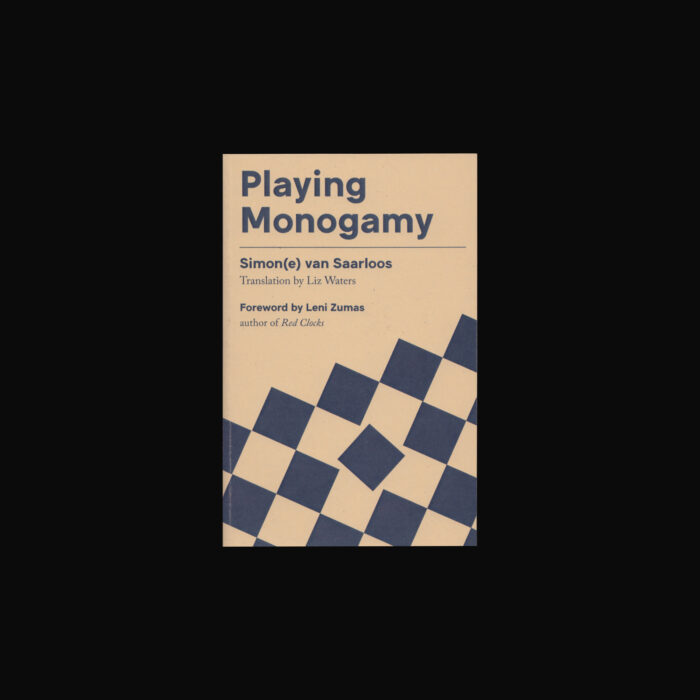Taste Is a Story
An excerpt from “Playing Monogamy”
Through a contemporary rereading of the cult of monogamy, Simon(e) van Saarloos playfully queers the way in which the structure of monogamy is upheld through social convention within Western contexts. Written for more of a lay audience, the book Playing Monogamy proposes an expanded and polyamorous engagement with intimacy and sexuality as a possible alternative. Originally written in Dutch and published by De Bezige Bij, and published in English by Publication Studio Rotterdam, this edition of the book is translated by Liz Waters, with a foreword by Leni Zumas, and a revised preface by Simon(e) themselves, addressing how they might approach writing about nonmonogamy differently four years after the book’s first publication—and after many experiences in between.
Eros and love are like faith and religion: there is the human predisposition, and then there is the formalized structure. Eros is the force that drives us to get to know the other, the beckoning space between me and something else, whether it be a person or a thing. The erasing of differences kills eros.
Love has no pure, transcendent or absolute form. Love is the institutionalized, social manifestation of the formless eros. Eros needs love in order to put in an appearance, but love is possible without eros, because as soon as eros is cast into a formal shape it can quietly slip away. The existence of a structure (such as the family) suffices for love to go on.
Every structure is based on exclusion. Certain feelings and behaviors are regarded as normal and others are not. Differences are often seen as a logical reason for exclusion. You might hear someone say, “But I just don’t fancy X.” I think taste is far more flexible than that. If falling in love really did happen in a flash, then love would have far more diverse manifestations. Couples would more often form across boundaries of class, culture, race and age. I believe taste is above all the story you tell yourself, backed up by cultural images of what is appropriate. Taste—vocalized preference—is an excuse to avoid the effort and discomfort of inclusivity.
In 2012 Alain de Botton published a book called How to Think More about Sex. He visited the Netherlands and the Dutch public media company PowNews decided to broadcast an item about him. Philosophy and sex: that was an odd combination, they decided. I walked through Amsterdam’s red-light district with the camera crew and in the cutting room my contribution was reduced to one clear sentence: “Sex is not natural.”
I didn’t mean that sex is unseemly or unimportant. I simply wanted to say that our behaviour in bed doesn’t come purely from the inside. We are guided by images and ideas from outside ourselves, even in our most intimate moments. What we recognize as sex is determined by more than just our organs of desire. Sexual arousal is not merely a physical feature that exists to cause reproduction; to a far greater extent it is a narrative.
I’m not denying that sex arises from an urge or a need. Sex is part of our lives, no less so than eating or sleeping. Yet people have eating disorders and sleep problems. What we have labelled as natural is not automatic. Things that are supposed to happen of their own accord often don’t.
In response to De Botton’s visit to the Netherlands, I too gave a talk on sex and philosophy. I showed drawings of various leaves—an ash, a plane, an oak and a poplar—and the logos of well-known brands—Nike, McDonald’s, Adidas and Starbucks. Both collections of images were the product of human artistry. The drawings of leaves were just as much drawings as the logos. Yet you would be inclined to say of the leaves that they were artificial, whereas you would not say that of the brands. This is logical, since in the case of trees you assume that real, natural versions exist, whereas logos are essentially nothing more than drawings. They are images we immediately recognize, and many of the brands will even suggest a story or a feeling. That’s what marketing does: it focuses on recognizability. Without logos to represent brand names, we would not be so quick to recognize the brands at all. Logos are fabrications that become real and have real effects, in that they arouse emotions or make you go into a specific shop. There’s a fair chance you will recognize more brands than leaves, but suppose you have an interest in trees and want to know more: you will very likely use pictures to learn the names. You don’t learn to identify leaves simply by learning their names, because the leaves don’t tell you their names. Their relationship with the word that applies to them is arbitrary, based on an agreement between those who classified and named the world’s flora and fauna and those who continue to accept their nomenclature.
“Sex is defined by collective ideas and agreements, and the personal, physical experience that arises from such an agreement can be communicated only by means of words that already exist.”
Even if you have real leaves, you will still need to match the shape of each leaf with its name. The meaning of all things that physically exist is to a great extent plucked out of the air, from an intermediate zone. In that zone hardly anything is fixed. Of course, there are trees whose names refer to certain characteristics, such as the milled edges of their leaves, but even then the language is not exhaustive or absolute, because the plant has all kinds of other characteristics that are not referred to by its name. Perhaps those things are more subtle (a certain shade of green, for example), but who is to say that a subtle characteristic is less definitive or important?
Sex is fascinating, because it exists in the way that depicted trees and leaves exist. There is the physical reality of bodies that touch, but without the words and images that circulate in society about sex we would not recognize those actions as sex. There needs to be a kind of agreement, an equivalent idea in language and image, before we as people can understand among ourselves what we mean by sex. A person who desires sex therefore desires not simply something natural but an image or story that has been created out of an agreement.
When same-sex marriage was introduced in the US, many people, including President Barack Obama, said “love is love”. But to recognize love as love we need comprehensible images. Stroking, intertwined hands, marriage sealed with a signature on a certificate, a photo of that special person as a background on your phone—these are the things that ensure we can identify love.

Eros, by contrast, is not an entity or thing that we can lay on the table. Sex is not a thing either. At best we can recognize a representation of sex, in words or an image. Furthermore, what we regard as sex is generally not done in public. Sex is certainly visible, but the experience of sex in the moment it actually happens is mostly shared afterwards, through words. It’s a kind of loop, in which the shared images of sex merge with the experience of sex. Sex is defined by collective ideas and agreements, and the personal, physical experience that arises from such an agreement can be communicated only by means of words that already exist.
On the one hand what happens in the bedroom is less private than we think, since our intimate sex lives depend on public images and ideas. This means we are continually thinking (perhaps without actually putting it into words): Oh, how is that supposed to go again, how do the movies tell us to do it? Our bodies have a register of actions and we act according to certain expectations.
On the other hand, what happens in bed is frustratingly private. There is undoubtedly a hidden aspect, an intimacy that cannot be shared. The essence of intimacy is indescribable. It is an experience that I pin down too firmly if I try to put it into words, but for me it feels roughly as if my skin is vibrating on the inside and that vibration seems to generate enough energy to fold my skin outwards. Intimacy comes in waves; as soon as it wells up and feels so great that it’s impossible to ignore, I want to acknowledge it and envisage it, but right at that moment it withdraws. A kind of tunnel vision is created. Everything around the lover—the color, the light—seems intended to flatter them. Details brighten. The small is suddenly very big, because for a few seconds the world is inside that moment.
You look at each other and think you know ‘it’. You feel ‘it’ together. But as soon as you try to attach a name, the words pull ‘it’ into something more general, something you could write down and later read and understand even when ‘it’ is no longer present. The naming of this intimacy is often intended as an affirmation; you try to underline what you feel at that moment by creating a valid, linguistic truth. ‘It’ thereby loses its momentary character and becomes a kind of promise for later, when ‘it’ has been absent for a while. That which is documented gains authority, more than the ‘it’ that needs to take place before there is anything to document.
As we have seen, psychologist Robert Sternberg regards intimacy as a process of self-revelation. He believes that lovers ultimately reach saturation point. Unlike him, I do not regard intimacy as a process of completion (the saturation), instead I think intimacy is an ephemeral experience of sharing that occurs in various forms only when you stop trying to get a grip on it. As soon as you attempt to turn it into a constant state, you betray the capricious, multifarious and momentary character of intimacy.
Even with the person with whom we lie in bed and with whom we experience intimacy, we can never entirely share our own experience. This is confusing, especially since we live in a visibility culture that makes a direct connection between visibility and freedom. The abnormal can be normalized by showing it. That which is visible and ‘out’ is normal. Intimacy is therefore, in fact, the abnormal domain.
To liberate intimacy the existence of the indescribable needs to be accepted. Silence doesn’t represent a lack. Rumi puts it like this:
“Out beyond ideas of wrongdoing and rightdoing,
there is a field. I’ll meet you there.
When the soul lies down in that grass,
the world is too full to talk about.
Ideas, language, even the phrase each other
doesn’t make any sense.”
That which cannot be named cannot be compared. Here we see how the essential character of intimacy converges with the necessary avoidance of comparison, as suggested under point four of the Social Wheel of Five.
Precisely for that reason, the indescribable is the least convincing space, the hardest to defend. At the same time there is a space that is easy to discuss: the context, the playing field within which intimacy is given free rein. (Anyone who has queer relationships or experiences a form of intimacy that diverges from the norm of a the white heterosexual couple made up of two people of around the same age will know how powerfully context and environment can determine our freedom of manoeuvre: can we ignore the looks and comments, do we dare to kiss here, is what we are doing a punishable offence?)

In the spring of 2014, a film was released in which twenty strangers kissed. The seconds that preceded the kiss were particularly awkward: “What was your name again?” and “Do we just do this?” A romantic soundtrack masked the sounds of kissing. The kiss film was viewed millions of times and shared around the world. Awkwardness—when seen from a distance—is endearing. The film turned out to be an advertising stunt by an American clothing company, and the strangers were in fact hired actors and models. Viewers felt reassured: we’re willing and able to do such a thing only if we get paid for it.
But other clips started appearing on the internet too, with real strangers, plucked at random from the street. Their kisses are less appetizing to watch, with no sentimental music to cover the smacking sounds. But they really do kiss.
So you can kiss spontaneously, with anyone. Although dating programmes like Naked Attraction or Love Island seem to suggest pornification and an absence of boundaries, television programmes of this kind are actually focused on the safety of inclusion and exclusion. Whom do you let in? Who deserves your undivided attention?
“The belief that a good sexual and intimate life is created by setting boundaries, by remaining true to yourself, arises from a discourse of criminalization. How would it be if we were to formulate our desires from the point of view of consent rather than boundaries?”
Sex has become too much of a boundary game. Feminists have done fantastic work on women’s pleasure in bed and have enabled us to talk about sexual harassment. But the government has converted the feminist battle against the patriarchy into a call for more criminalization and control. In the Netherlands, for example, a debate has been going on for years about ways of tackling intimidation on the street, and in Rotterdam fines have been introduced. Cat calling and hissing on the street can lead to criminal charges, intended to make public space safer for women. But a fine does nothing to address the fact that domestic violence is particularly common from police officers and serving soldiers—precisely the authority figures deployed to protect women on the street. Fines for street intimidation are disproportionately likely to be handed out to men of color. From our colonial context, and from today’s America, we know that the fears of white women are fueled and deployed to criminalize non-white men. LGBTQ people can be deemed paedophiles or immoral at any time. The criminalization of undesirable behavior is used to make a few people feel comfortable and secure. Kimberlé Crenshaw, the legal scholar who coined the term ‘intersectionality’, talks about the misplaced trust white women have in the nuclear family. “White women aren’t safe. Why not? Because they are always told that they need to fear black men and Mexican men. They are told to stay safe by keeping strangers out. Meanwhile, their own men, their own fathers and their own neighbors are the ones violating them.”
Mariame Kaba, prison abolitionist and restorative justice organizer, stresses that we recognize some people as predators and criminals while ‘Uncle Joe’ goes free, because “that’s just Uncle Joe”. Which explains why free sex and intimacy seem to be accessible by means of a “with whom?”question, such that setting boundaries and making distinctions is intended to create a safe space. Whenever the ‘with whom?’ question comes first, the behavior (the ‘what?’) of many people goes unmentioned.
The belief that a good sexual and intimate life is created by setting boundaries, by remaining true to yourself, arises from a discourse of criminalization. How would it be if we were to formulate our desires from the point of view of consent rather than boundaries? If we fantasize from the starting point of consent, we make speculative space for being together where the wish, the feeling of possibility, is central, rather than the lines we draw. As long as we continue to start out by thinking of boundaries, we formulate sex and intimacy in response to repression, or the fear of it. I do not mean by this that a difficult relationship with sex and intimacy is illogical. As Kaba says, “We are all harmed people. We have all been harmed before we harm.” She asks us “to respond to personal trauma with political commitment.” I propose an active commitment to thinking from the perspective of consent. What do I want? Which acts would I like? Which intimacies can I imagine? Centralizing a perspective of consent may help us to dispense with the false hope of reaching safety and freedom through the setting of boundaries, through fines and punishment, exclusion, and the urge to protect and save.
I am insistent about this change in perspective because placing the emphasis on boundaries as the basis for a free sexuality always means that we operate within the boundaries without being particularly alert. After all, Uncle Joe is free to operate however he likes within those boundaries.
We short-change ourselves and others if we appreciate awkwardness only from a distance. We need to devise more contexts for indescribable unease. It creates receptivity and requires anticipation. Our capacity for anticipation is an individual life skill that leads to greater connection with others. The fact that intimacy and sex are special does not mean that eros is available only in limited quantities. “Why should it be essential to love rarely in order to love much?” Camus writes of Don Juan.
“A relationship is a drama, a game that plays with the norms of human interaction, and seduction is explicitly approached as a game, which you have to enter into with conviction and which, because of certain instruments and rules, briefly liberates you from yourself.”
Pick-up coaches have monetized the teaching of this special life skill. They sell themselves as a modern Don Juan, and men who want practice at seduction take courses in which they learn how to speak to a woman they haven’t met. Famous coaches of this sort claim that today’s growing uncertainty among men has to do with the increasing emancipation of women. It is indeed high time to take a close look at male sexuality. The male orgasm was assumed to be natural, whereas female sexuality was seen as problematic. The man was never confronted with his own doubts and uncertainties because his sexuality was always the norm.
A more interesting aspect of the phenomenon of the pick-up coach is the fact that it is all about a game. The playful aspect is undisguised; making contact is something you can learn and speaking to women can be regarded as an exercise. The man must not simply be himself; he must act according to etiquette. The exercises men are told to perform in public take a theatrical form. A relationship is a drama, a game that plays with the norms of human interaction, and seduction is explicitly approached as a game, which you have to enter into with conviction and which, because of certain instruments and rules, briefly liberates you from yourself. The game of seduction gives you space to take yourself very seriously within a clearly defined context, so that you are not impeded by the idea that what you do at that moment absolutely defines who you are. The rules of the game form the framework within which spontaneity is possible.
What is problematic, however, is that the game encouraged by pick-up coaches is presented as a natural truth. They appeal to all kinds of deterministic ideas about men and women and thereby undermine the game. They claim that society has civilized (read: castrated) you, as a man, but that the seduction tricks they teach you will allow you to recover your true nature. Thoughts and behaviour are undoubtedly shaped by culture, but our nature is precisely that: people are malleable. There is no true nature to be recovered. A person wanting to become who they truly are turns not inwards but outwards. You hitch your soul to your role.
The self-assurance men feel after being taught by a pick-up coach is of course impressive. Not because they are suddenly in touch with their true natures but because their exaggeratedly self-conscious behaviour is confusing. Their explicit performance of behaviour is a kind of power, since we generally conceal the fact that we are behaving. These men break with the daily course of events, and that can be attractive or sexy, because any break with routine implies romance. Their aberrance creates a desire to grab hold of it before it evaporates again.
Another thing that makes lessons in seduction interesting is the studied indifference towards the receiving party (the woman). The men who take their training seriously are urged to go up to women on the street. Participants encourage each other, goading and applauding. The men are really continually giving. They reach out, dispensing compliments willy-nilly, but without any need to take the other person into account. When they walk up to a woman and speak to her, whether or not she wants them to is irrelevant. What matters is that the trainee shows he is capable of acting that way. You can speak to a women you’ve never met. It sounds terribly intrusive, but this giving of attention without having any expectations is instructive as well. Seduction is disconnected from a specific other person. The men are training themselves and themselves alone.
The indifference of these men to the reactions they receive is nevertheless merely a strategy. Eventually they are aiming to control, to take or to get another person. In essence all their behaviour is focused on one thing—the seduction of women—and as soon as they succeed or fail the box-ticking exercise finishes. The techniques and tricks are not an end in themselves but a means to an end, namely getting the woman. The man who applies these techniques of seduction is not a relational flâneur, he is a dog doing tricks in the hope of a biscuit. Should he get any pleasure out of the tricks he has learnt, that pleasure will always be subordinate to the reward he has in mind. The biscuit he craves will then either taste utterly delicious (muse) or be a horrendous disappointment (monster). What he is lacking is the spontaneity needed to play a game without a goal.





